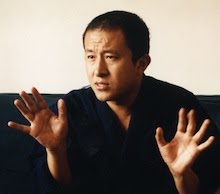 Several videos of Rinpoche's teachings can now be found on YouTube, including this video on "The attitude of a Dzogchen practitioner" (play): "the easiest way to get to Dzogchen is to take things easy. We have this saying, but we don't actually practice that. A Dzogchen practitioner can't be bothered by any circumstances, whether good or bad"
Several videos of Rinpoche's teachings can now be found on YouTube, including this video on "The attitude of a Dzogchen practitioner" (play): "the easiest way to get to Dzogchen is to take things easy. We have this saying, but we don't actually practice that. A Dzogchen practitioner can't be bothered by any circumstances, whether good or bad"
Tuesday, June 30, 2009
Rinpoche on YouTube
 Several videos of Rinpoche's teachings can now be found on YouTube, including this video on "The attitude of a Dzogchen practitioner" (play): "the easiest way to get to Dzogchen is to take things easy. We have this saying, but we don't actually practice that. A Dzogchen practitioner can't be bothered by any circumstances, whether good or bad"
Several videos of Rinpoche's teachings can now be found on YouTube, including this video on "The attitude of a Dzogchen practitioner" (play): "the easiest way to get to Dzogchen is to take things easy. We have this saying, but we don't actually practice that. A Dzogchen practitioner can't be bothered by any circumstances, whether good or bad"
Sunday, June 28, 2009
Buddhist History - Week 2
On Sunday 28th June, we reviewed what we covered last week (to p.10 of Conze's "Buddhism: A Short History"), and then continued to p.22, covering the Three Jewels and the history of the "18 sects", including the three most important splits among the early Buddhist schools between ~340BC-240BC. A recording is available here (Hit the blue "Download Now" button. I hope quality issues have been resolved). Among the topics we covered this week:
- These schools correspond to our emotions, as Rinpoche points out when teaching Madhyamika. For example, the notion of "no self" offends everyday commonsense, and also Buddhist ideas of karma and reincarnation (how can we speak of a "person" taking rebirth unless there is some continuity between this life and the next life?), so the Vatsiputriyas (the Personalists) invented the notion of a real "Person" in order to explain this. We reflected that many of us have a similar emotional clinging to the notion of our own rebirth/next life.
- The essential view of the Tibetan Buddhist path was established over 2,300 years ago - so it's not at all a recent invention or reinterpretation. Even around 340BC, the Mahasanghikas had established a view that holds the seeds of the later Mahayana and Vajrayana. They believed: (i) the 'real' Buddha is transcendental, and the historical Buddha was simply a manifestation or magical emanation for the sake of teaching and benefiting sentient beings. In fact, Buddhas are manifesting at all times in all realms. (ii) the nature of thought/mind is pure, and all impurities (such as ignorance and negative emotions) are adventitious, i.e. they are not part of mind itself. (iii) the ultimate truth cannot be expressed in words or concepts - they can only ever refer to relative truth.
50th Anniversary of Dzongsar Jamyang Khyentse Chökyi Lodrö (and video tribute)

According to the Tibetan calendar, today is the 50th anniversary of the parinirvana of Rinpoche's previous incarnation, Dzongsar Jamyang Khyentse Chökyi Lodrö (thanks to Maggie for the picture of him sitting under the bodhi tree at Bodh Gaya). There's a lovely tribute video available here (thanks to Grey Fox, Adam, Pete and Volker at Remembering the Masters).
Wednesday, June 24, 2009
Buddhist History - Part 1
On Sunday 21st June, we began Edward Conze's "Buddhism: A Short History", completing the Introduction and up to p.9 of chapter 1. A recording of our conversation may be found here (hit the blue "download now" button). Among the many topics of conversation, there was a particular focus on the role of magic in the Vajrayana (Conze refers to its "cosmic" focus), and how we might best interpret and understand that in the context of the modern, scientifically-minded Western world.
Thursday, June 4, 2009
Rinpoche's Teachings on "Parting from the Four Attachments"
Rinpoche is teaching "Parting from the Four Attachments" this week in Kathmandu. Daily MP3 recordings can be downloaded here.
From the Siddhartha's Intent website: The teaching on Parting from the Four Attachments is universally regarded as one of the jewels of Tibetan Buddhism. A supremely important mind training from the Sakyapa tradition, it was transmitted by Manjushri to the first of its Five Founding Fathers - Sachen Kunga Nyingpo (1092-1158). In four lines of profound instruction it challenges the assumptions and belief systems that destroy the very happiness and freedom to which all beings aspire. It introduces the heart of wisdom, the key points of the Buddhist path, and particularly how to proceed on the path without being sidetracked by pitfalls. This work is eminently practical, and is said to have the power to instil realization in the minds of practitioners as it is spoken, listened to, and understood.
Tuesday, June 2, 2009
Review of Rinpoche's new approach to the ngöndro
A recording of this week's teachings and discussion (from 31st May) can be downloaded here. We reviewed Rinpoche's teaching in Rio last year where he explained the importance of ngöndro and how the way it is being taught and practiced in the West needs to change.
Subscribe to:
Posts (Atom)
.jpg)
.jpg)